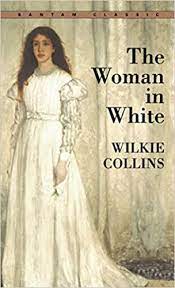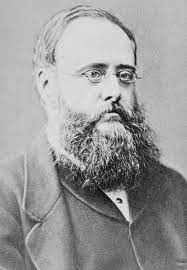The Woman in White Page #2
The Woman in White is Wilkie Collins's fifth published novel, written in 1859. It is a mystery novel and falls under the genre of "sensation novels". The story is an early example of detective fiction with protagonist Walter Hartright employing many of the sleuthing techniques of later private detectives
believed that he could learn impromptu. Soon after we had both struck out from shore, I stopped, finding my friend did not gain on me, and turned round to look for him. To my horror and amazement, I saw nothing between me and the beach but two little white arms which struggled for an instant above the surface of the water, and then disappeared from view. When I dived for him, the poor little man was lying quietly coiled up at the bottom, in a hollow of shingle, looking by many degrees smaller than I had ever seen him look before. During the few minutes that elapsed while I was taking him in, the air revived him, and he ascended the steps of the machine with my assistance. With the partial recovery of his animation came the return of his wonderful delusion on the subject of swimming. As soon as his chattering teeth would let him speak, he smiled vacantly, and said he thought it must have been the Cramp. When he had thoroughly recovered himself, and had joined me on the beach, his warm Southern nature broke through all artificial English restraints in a moment. He overwhelmed me with the wildest expressions of affection--exclaimed passionately, in his exaggerated Italian way, that he would hold his life henceforth at my disposal--and declared that he should never be happy again until he had found an opportunity of proving his gratitude by rendering me some service which I might remember, on my side, to the end of my days. I did my best to stop the torrent of his tears and protestations by persisting in treating the whole adventure as a good subject for a joke; and succeeded at last, as I imagined, in lessening Pesca's overwhelming sense of obligation to me. Little did I think then--little did I think afterwards when our pleasant holiday had drawn to an end--that the opportunity of serving me for which my grateful companion so ardently longed was soon to come; that he was eagerly to seize it on the instant; and that by so doing he was to turn the whole current of my existence into a new channel, and to alter me to myself almost past recognition. Yet so it was. If I had not dived for Professor Pesca when he lay under water on his shingle bed, I should in all human probability never have been connected with the story which these pages will relate--I should never, perhaps, have heard even the name of the woman who has lived in all my thoughts, who has possessed herself of all my energies, who has become the one guiding influence that now directs the purpose of my life. III Pesca's face and manner, on the evening when we confronted each other at my mother's gate, were more than sufficient to inform me that something extraordinary had happened. It was quite useless, however, to ask him for an immediate explanation. I could only conjecture, while he was dragging me in by both hands, that (knowing my habits) he had come to the cottage to make sure of meeting me that night, and that he had some news to tell of an unusually agreeable kind. We both bounced into the parlour in a highly abrupt and undignified manner. My mother sat by the open window laughing and fanning herself. Pesca was one of her especial favourites and his wildest eccentricities were always pardonable in her eyes. Poor dear soul! from the first moment when she found out that the little Professor was deeply and gratefully attached to her son, she opened her heart to him unreservedly, and took all his puzzling foreign peculiarities for granted, without so much as attempting to understand any one of them. My sister Sarah, with all the advantages of youth, was, strangely enough, less pliable. She did full justice to Pesca's excellent qualities of heart; but she could not accept him implicitly, as my mother accepted him, for my sake. Her insular notions of propriety rose in perpetual revolt against Pesca's constitutional contempt for appearances; and she was always more or less undisguisedly astonished at her mother's familiarity with the eccentric little foreigner. I have observed, not only in my sister's case, but in the instances of others, that we of the young generation are nothing like so hearty and so impulsive as some of our elders. I constantly see old people flushed and excited by the prospect of some anticipated pleasure which altogether fails to ruffle the tranquillity of their serene grandchildren. Are we, I wonder, quite such genuine boys and girls now as our seniors were in their time? Has the great advance in education taken rather too long a stride; and are we in these modern days, just the least trifle in the world too well brought up? Without attempting to answer those questions decisively, I may at least record that I never saw my mother and my sister together in Pesca's society, without finding my mother much the younger woman of the two. On this occasion, for example, while the old lady was laughing heartily over the boyish manner in which we tumbled into the parlour, Sarah was perturbedly picking up the broken pieces of a teacup, which the Professor had knocked off the table in his precipitate advance to meet me at the door. "I don't know what would have happened, Walter," said my mother, "if you had delayed much longer. Pesca has been half mad with impatience, and I have been half mad with curiosity. The Professor has brought some wonderful news with him, in which he says you are concerned; and he has cruelly refused to give us the smallest hint of it till his friend Walter appeared." "Very provoking: it spoils the Set," murmured Sarah to herself, mournfully absorbed over the ruins of the broken cup. While these words were being spoken, Pesca, happily and fussily unconscious of the irreparable wrong which the crockery had suffered at his hands, was dragging a large arm-chair to the opposite end of the room, so as to command us all three, in the character of a public speaker addressing an audience. Having turned the chair with its back towards us, he jumped into it on his knees, and excitedly addressed his small congregation of three from an impromptu pulpit. "Now, my good dears," began Pesca (who always said "good dears" when he meant "worthy friends"), "listen to me. The time has come--I recite my good news--I speak at last." "Hear, hear!" said my mother, humouring the joke. "The next thing he will break, mamma," whispered Sarah, "will be the back of the best arm-chair." "I go back into my life, and I address myself to the noblest of created beings," continued Pesca, vehemently apostrophising my unworthy self over the top rail of the chair. "Who found me dead at the bottom of the sea (through Cramp); and who pulled me up to the top; and what did I say when I got into my own life and my own clothes again?" "Much more than was at all necessary," I answered as doggedly as possible; for the least encouragement in connection with this subject invariably let loose the Professor's emotions in a flood of tears. "I said," persisted Pesca, "that my life belonged to my dear friend,
Translation
Translate and read this book in other languages:
Select another language:
- - Select -
- 简体中文 (Chinese - Simplified)
- 繁體中文 (Chinese - Traditional)
- Español (Spanish)
- Esperanto (Esperanto)
- 日本語 (Japanese)
- Português (Portuguese)
- Deutsch (German)
- العربية (Arabic)
- Français (French)
- Русский (Russian)
- ಕನ್ನಡ (Kannada)
- 한국어 (Korean)
- עברית (Hebrew)
- Gaeilge (Irish)
- Українська (Ukrainian)
- اردو (Urdu)
- Magyar (Hungarian)
- मानक हिन्दी (Hindi)
- Indonesia (Indonesian)
- Italiano (Italian)
- தமிழ் (Tamil)
- Türkçe (Turkish)
- తెలుగు (Telugu)
- ภาษาไทย (Thai)
- Tiếng Việt (Vietnamese)
- Čeština (Czech)
- Polski (Polish)
- Bahasa Indonesia (Indonesian)
- Românește (Romanian)
- Nederlands (Dutch)
- Ελληνικά (Greek)
- Latinum (Latin)
- Svenska (Swedish)
- Dansk (Danish)
- Suomi (Finnish)
- فارسی (Persian)
- ייִדיש (Yiddish)
- հայերեն (Armenian)
- Norsk (Norwegian)
- English (English)
Citation
Use the citation below to add this book to your bibliography:
Style:MLAChicagoAPA
"The Woman in White Books." Literature.com. STANDS4 LLC, 2025. Web. 20 Jan. 2025. <https://www.literature.com/book/the_woman_in_white_1567>.




Discuss this The Woman in White book with the community:
Report Comment
We're doing our best to make sure our content is useful, accurate and safe.
If by any chance you spot an inappropriate comment while navigating through our website please use this form to let us know, and we'll take care of it shortly.
Attachment
You need to be logged in to favorite.
Log In